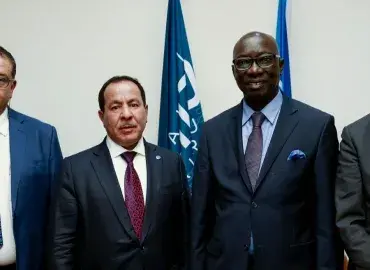UNITED NATIONS OFFICE ON GENOCIDE PREVENTION/ KAICIID-/ MOROCCAN INTER-MINISTERIAL DELEGATION FOR HUMAN RIGHTS: JOINT CONFERENCE

United Nations Office on Genocide Prevention/ KAICIID-/ Moroccan Inter-Ministerial Delegation for Human Rights
Joint Conference
The Role of Religious Leaders in Preventing Atrocity Crimes
The King Abdullah Bin Abdulaziz International Centre for Interreligious and Intercultural Dialogue (KAICIID), and the United Nations Office on Genocide Prevention and the Responsibility to Protect, together with the Inter-Ministerial Delegation for Human Rights (DIDH) of the Government of the Kingdom of Morocco, is organising a conference on the Role of Religious Leaders in Preventing Incitement that could lead to Atrocity Crimes from 23-24 April, in Fes, Morocco.
The conference is organised with the support of the Rabita Mohammadia of Ulamas in Morocco.
Participants at the conference will discuss the role of religious leaders and faith-based organisations in preventing atrocity crimes, in other words genocide, war crimes and crimes against humanity. KAICIID Secretary General Faisal Bin Muaammar said: “At KAICIID we completely reject the misuse of religion as a justification for violence. Religious leaders have an influential role to play in countering the abuse of religion, and we encourage them to speak out firmly and promptly against violence - and against hate speech. Their powerful voices can make it crystal clear that there is no justification for violence as a response to incitement to hatred.
Religious leaders are leaders in their communities: they have a responsibility to protect the people they serve. Especially in societies where tensions between communities threaten to cause violence, dialogue and cooperation between religious leaders from all involved communities is crucial in preventing bloodshed.”
“The prevention of religious tensions and intolerance requires the involvement of all sectors of society,” noted Adama Dieng, United Nations Special Adviser on the Prevention of Genocide. “However, religious leaders can play a specific and critical role. Given the profound influence that they have over their followers, at the community level and at the national and international levels, religious leaders can and must play a role in preventing, mitigating and resolving tensions and conflicts between people of different faiths. By doing so, they can help to prevent the kind of violence that could lead to atrocity crimes.”
Media Representatives are cordially invited to attend the opening plenary session:
Date: 23 April 2015
Time: 09.00-09.30 AM
Venue: Hotel Les Merinides, Douar El Magta, Fes, Morocco
Panelists:
Faisal Bin Muaammar, Secretary General, KAICIID Dialogue Centre
Adama Dieng, Special Adviser on the Prevention of Genocide
Mahkoub Elhaiba, The Interministerial Delegate for Human Rights
Ahmed Elabbadi, Secretary General of the Moroccan Rabita Mohammadia of Ulamas
For more information, images or interview opportunities please contact:
Nayana Jayarajan
KAICIID Communications
[email protected]/ +43 1 313 22 408/ +43 664 889 64 355
Washington, DC -- During a two-day conference hosted at the United States Institute of Peace, on 29 February and 1 March,…
VIENNA, 31 October 2019 – The International Dialogue Centre (KAICIID) and the United Nations Office on Genocide Prevention and…
© REUTERS/Rodi Said A displaced woman from the minority Yazidi sect, fleeing violence from forces loyal to the Islamic State…

![KAICIID Sr. Adviser Prof Abu-Nimer speaking at meeting at the United States Institute for Peace on role of religious leaders in preventing atrocity crimes. Photo: KAICIID [file:field-file-image-alt-text]](/sites/default/files/styles/cards_360_270_scale_crop/public/ccz6froukaaetht.jpg_large.jpg.webp?itok=s3pc1xG8)

![[file:field-file-image-alt-text]](/sites/default/files/styles/cards_360_270_scale_crop/public/jjhj_small.jpg.webp?itok=Xmvcclvc)